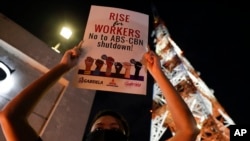Philippine church and business leaders expressed alarm Wednesday over a government agency’s shutdown of the country’s largest TV and radio network, which has been a major provider of news on the coronavirus pandemic.
International watchdogs condemned the closure of ABS-CBN Corp., which President Rodrigo Duterte has targeted in the past for its critical coverage, as a major blow to press freedom in an Asian bastion of democracy.
The National Telecommunications Commission ordered the media giant to stop operating after its 25-year congressional franchise ended Monday. It reversed a statement to Congress that it would issue a temporary permit while legislators assess a franchise renewal. Only the House of Representatives can grant or revoke such franchise and its hearings have been delayed, in part by a coronavirus lockdown.
In a reflection of the extent of unease over the shutdown of the network, which went off air Tuesday night, both the opposition and key Duterte allies questioned the commission’s action.
Vice President Leni Robredo, who leads the opposition, said the timely dissemination of accurate information saves lives in a crisis and galvanizes national unity.
“Closing down ABS-CBN costs lives, on top of unnecessarily burdening the thousands who will lose their jobs,” she said.
Rep. Franz Alvarez, who belongs to a pro-Duterte coalition and heads the House Committee on Legislative Franchises, said the telecommunications commission’s order “is a clear encroachment on the jurisdiction of the House.”
Alvarez told ABS-CBN’s DZMM radio station that commission officials told lawmakers in a hearing in March that they would issue a temporary operating permit to ABS-CBN while its franchise renewal was pending based on guidance from the Department of Justice.
“We’re really surprised why they backtracked so they have to explain,” Alvarez told DZMM before it too went off air late Tuesday.
The Makati Business Club, a prestigious group of top business executives, said the network’s closure was a setback to national unity amid the unprecedented crisis.
Amnesty International in the Philippines said the closure order was an “outrageous attack” on media freedom and asked the government to immediately to bring the network back on air.
Bishop Gerardo Alminaza of the Catholic Bishops Conference of the Philippines protested the closure “on behalf of journalists and thousands of workers affected by the decision” as they struggled to cope with the contagion.
ABS-CBN has more than 11,000 news and production personnel nationwide. Aside from reporting on the coronavirus, which has infected nearly 10,000 people and killed 637 in the Philippines, it has also provided truckloads of food and medical aid.
Media watchdogs accused Duterte and his government of muzzling independent media like ABS-CBN that have reported critically on issues including the president’s anti-drug crackdown, in which thousands of mostly poor drug suspects have been killed. Government officials denied the closure was a press freedom issue, insisting that everyone must comply with the law.
Presidential spokesman Harry Roque said Tuesday that ABS-CBN was free to seek legal solutions and added that Duterte has left its fate to Congress.
But ahead of the franchise expiration, Solicitor-General Jose Calida asked the Supreme Court in February to revoke the operating franchises of ABS-CBN and a subsidiary in a separate attempt to shut down the company for allegedly abusing its franchises and violating a constitutional prohibition on foreign investment in Philippine media. ABS-CBN denied the allegations.
Philippine TV Network Shutdown Amid Pandemic Sparks Uproar




